

Irish language. English language. English is a West Germanic language that was first spoken in early medieval England and is now a global lingua franca.[5][6] It is an official language of almost 60 sovereign states and the most commonly spoken language in sovereign states including the United Kingdom, the United States, Canada, Australia, Ireland, New Zealand and a number of Caribbean nations.
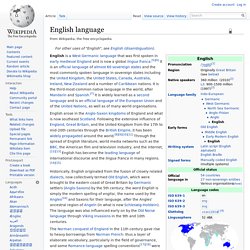
English. World Englishes. Boston accent. The Boston accent is the regional accent or sub-dialect of New England English spoken in the city of Boston and much of eastern Massachusetts.
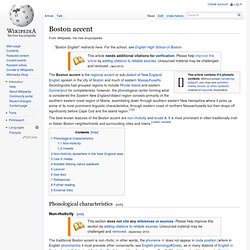
Sociolinguists had grouped regions to include Rhode Island and eastern Connecticut for completeness; however, the phonological center forming what is considered the Eastern New England dialect region consists primarily of the southern eastern coast region of Maine, assimilating down through southern eastern New Hampshire where it picks up some of its most prominent linguistic characteristics, through eastern coast of northern Massachusetts but then drops off significantly before Cape Cod and the island region.[1][2] The best-known features of the Boston accent are non-rhoticity and broad A.
It is most prominent in often traditionally Irish or Italian Boston neighborhoods and surrounding cities and towns. [citation needed] Phonological characteristics[edit] Non-rhoticity[edit] Vowels[edit] Boston English has a so-called "nasal short-a system". Blinkers. Languages mapped in the UK. Turn autoplay off Edition: <span><a href=" Sign in Beta About us Today's paper Subscribe Custom Search Languages mapped: what do people speak where you live?
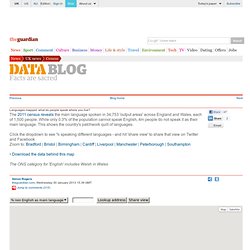
English-based creole languages. An English-based creole language (often shortened to English creole) is a creole language derived from the English language.
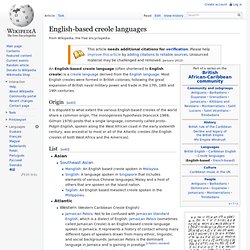
Most English creoles were formed in British colonies, following the great expansion of British naval military power and trade in the 17th, 18th and 19th centuries. Origin[edit] Middle English. Middle English describes dialects of English in the history of the English language between the High and Late Middle Ages, or roughly during the three centuries between the late 12th and the late 15th century.
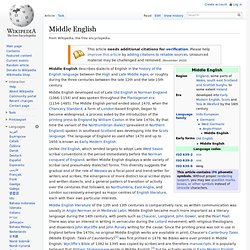
Middle English developed out of Late Old English in Norman England (1066–1154) and was spoken throughout the Plantagenet era (1154–1485). The Middle English period ended about 1470, when the Chancery Standard, a form of London-based English, began to become widespread, a process aided by the introduction of the printing press to England by William Caxton in the late 1470s. Old English. Old English (Ænglisc, Anglisc, Englisc) or Anglo-Saxon[1] is an early form of the English language that was spoken and written by the Anglo-Saxons and their descendants in parts of what are now England and southern and eastern Scotland between at least the mid-5th century and the mid-12th century.
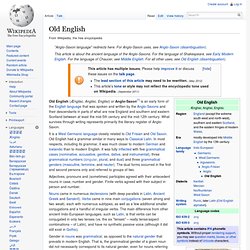
What survives through writing represents primarily the literary register of Anglo-Saxon. Adjectives, pronouns and (sometimes) participles agreed with their antecedent nouns in case, number and gender. Finite verbs agreed with their subject in person and number. Gender in nouns was grammatical, as opposed to the natural gender that prevails in modern English. That is, the grammatical gender of a given noun did not necessarily correspond to its natural gender, even for nouns referring to people. From the 9th century, Old English experienced heavy influence from Old Norse, a member of the related North Germanic group of languages. English languages.
English-based creole languages are not generally included, as only their lexicon, not their linguistic structure, comes from English.
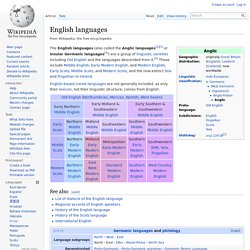
See also[edit] References[edit] Jump up ^ Nordhoff, Sebastian; Hammarström, Harald; Forkel, Robert; Haspelmath, Martin, eds. (2013). "Anglian". Glottolog. Early Modern English. Prior to and following the accession of James I to the English throne in 1603 the emerging English standard began to influence the spoken and written Middle Scots of Scotland.
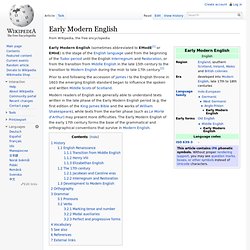
Modern readers of English are generally able to understand texts written in the late phase of the Early Modern English period (e.g. the first edition of the King James Bible and the works of William Shakespeare), while texts from the earlier phase (such as Le Morte d'Arthur) may present more difficulties.